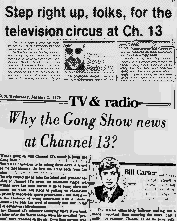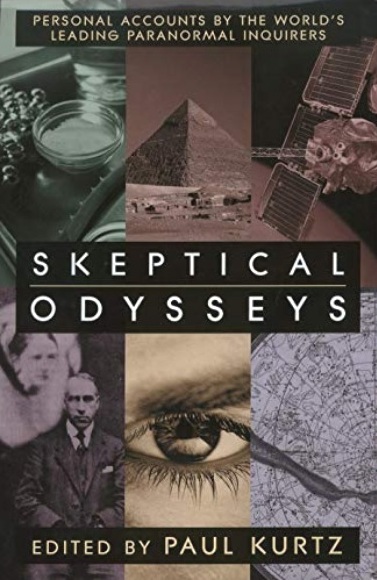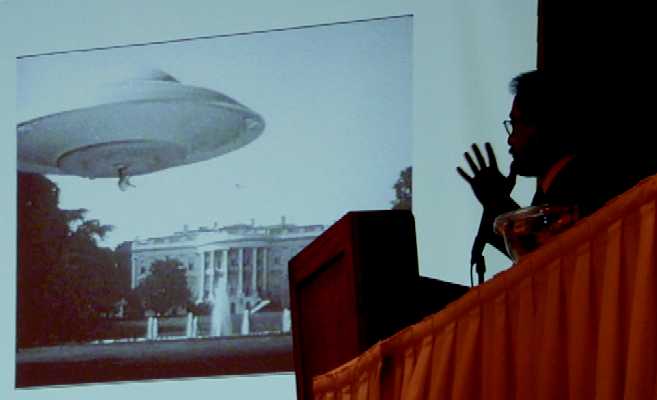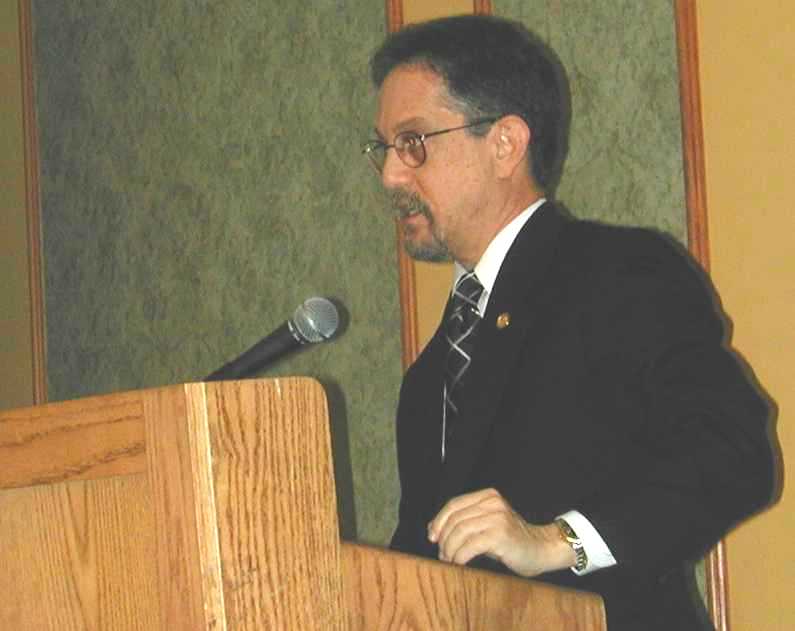 On October 19 of that year, an article
in the Baltimore Evening Sun (and picked up by the
Associated Press) was headlined, "World Series Results Foreseen by Stone." It began:
"Mark Stone, a
stockbroker and self-styled psychic who has appeared on national television, apparently
predicted correctly the outcome of each game of the 1978 World Series, including key plays like
Reggie Jackson's full-count strikeout and Davey Lopes' two-homerun performance."
On October 19 of that year, an article
in the Baltimore Evening Sun (and picked up by the
Associated Press) was headlined, "World Series Results Foreseen by Stone." It began:
"Mark Stone, a
stockbroker and self-styled psychic who has appeared on national television, apparently
predicted correctly the outcome of each game of the 1978 World Series, including key plays like
Reggie Jackson's full-count strikeout and Davey Lopes' two-homerun performance."
Stone's performance took place on WJZ-TV 13. As the article explained,
"Stone wrote his predictions on a single sheet of paper on Oct. 8, two days before the first
game. . . . The paper was placed in a matchbox which was bound with a rubber band and sealed in an
envelope. That, in turn, was locked in a metal box that was wrapped in brown paper and taped shut,
then given to [sportscaster Klaus] Wagner on the air. Wagner held it until last night, when it was
opened during the station's evening newscast." Wagner was then quoted: "I couldn't believe it,
honestly. He couldn't have gotten to it beforehand. No way he could have faked it -- no way."
Aside from doing a few card tricks, the one and only piece of magic apparatus I can remember having,
as a young child, involved getting a coin into an empty cloth pouch, which was contained within a
closed matchbox, which in turn was enclosed within a larger cardboard box. The trick involved surreptitiously
slipping the coin through a hidden slot in the side of the box, with the help of a little
shoehorn-type device. (My sincere apologies to David Copperfield if this revelation derails his
career.)
Could Stone have merely performed a slightly more sophisticated version of this child's play? That
was my immediate suspicion, not only because of my evolving skepticism of all things paranormal, but
because I knew more about Stone than the article had revealed. Although I hadn't realized that he was a
"psychic" stockbroker, I knew that he was a magician, having seen his classified ads in the
Baltimore Jewish Times, such as this one I later saved from February 16, 1979:
"Having a party? Call Mark A. Stone, mentalist, for an evening of unique entertainment! [Phone number]."
And I had also seen both of his "national television" appearances on the Tonight Show
several years earlier. During the first, Johnny Carson, an amateur magician himself, was very
polite as he observed Stone's card machinations. But he then invited Stone to return several weeks
later at which time Carson would control the conditions himself. I remember Carson telling Stone
that, if he was indeed a genuine "psychic" as opposed to simply a magician, he should be able to
succeed just as easily under such conditions.
Stone foolishly took Carson up on his offer. And for this test, Carson had Stone move
across the stage so that he couldn't observe the order of the symbol cards as Carson shuffled the
deck. Stone's performance this time was again 100 percent -- a 100 percent disaster. I didn't remember ever having
been as embarrassed for a Tonight Show guest, other than the night Carson had devoted
his entire ninety-minute program to New Orleans District Attorney Jim Garrison and his incoherent
Kennedy assassination conspiracy theories.
A few days after the World Series miracle, I wrote to WJZ station manager William Baker to make him
aware of what I knew about Stone. I included the 1976 Time magazine article about the
founding of CSICOP and its philosophy with regard to claims such as Stone's. And I received
a prompt reply from Baker thanking me,
and informing me that, "I have asked my news department and program
department to contact you regarding appearances on our air to explain what might have occurred."
But I heard from neither, and eventually assumed that the entire fiasco had simply blown over. Not
quite.
Rather than taking heed of my warnings, the powers that be at WJZ soon invited Stone back for a
command performance -- to predict the results of the upcoming Super Bowl! At that point I brought
James "The Amazing" Randi
in on the case, and he sent the station
manager and news director a few simple tips as to how to keep Stone "honest." Randi added, "I urge
you, if not only for the protection of your viewers, then for the dignity and integrity of WJZ-TV,
to control the tricks of Mark Stone."
Although neither Randi nor I heard further from the station, apparently we were somewhat successful
in getting our message across. During the January 5 evening sportscast, when Stone (purportedly)
sealed away his "predictions" for disclosure later in the month following the big game, this bit of
by-play took place:
STONE: I make no claims to having any psychic abilities. I am here as an entertainer. This will be
a fun part of the news. . . .
WAGNER: Are you saying this is a trick?
STONE: No. I'm saying I'm an entertainer. . . . I set it up to show.
And here's what happened on January 22, 1979, the day after Super Sunday. During the sports segment
of the 6 p.m. news, Stone's locked box, which had been stored off the premises by Purolator Security,
was ceremoniously carried back into the studio by one of the company's armed guards and handed to
sportscaster Klaus Wagner. He then unlocked the outer box with a key given to him by Stone, who was
seated immediately beside him. Inside was a well-taped cardboard box, which Wagner proceeded to tear
open, revealing another locked metal box. But this time, when handed its key, Wagner could not jimmy
the lock open. The news anchorman then tried himself, but the key simply wouldn't work. Then Stone
said, "I know I can get it open if you just give me the key for a few seconds" (a close paraphrase
if not an exact quote).
And within a few seconds, Stone did indeed manage to unlock the inner box. But while doing so, he
had placed the box on his lap, hidden from camera view by the news desk. The box was partially open
when he handed it back for Wagner to retrieve the hidden "predictions." Wagner then tore open the
innermost cardboard box, which -- hold on to your hat! -- contained astonishingly accurate
"predictions" about the Super Bowl's score and key plays.
As a medical resident, I happened to be on call at the hospital that night, and watched the
spectacle from our lounge. I think the staff at WJZ was still applauding when I sprang up and
telephoned the station. I was able to reach news director Scott Goodfellow, whose secretary had
assured me earlier in the day that, during his appearance, Stone would issue a clear statement as
to "what he is and what he isn't." No such disclaimer was made, however. And I also pointed out to
Goodfellow how, by hiding the box for several seconds, magician Stone had ample opportunity to slip
his list of "predictions" into a trick box.
Only the next afternoon did I find out what had been revealed on the previous night's 11:00 newscast!
Right after the 6:00 news had concluded, and perhaps as a result of my call (and a few others),
Wagner took a closer look at the innermost cardboard box and found a covert slot. With the cameras
still taping, he then confronted Stone, who said (per a newspaper article), "Well, I told you all along
I was an entertainer." The station led the 11:00 news by showing that tape, accompanied by lame
apologies from Wagner ("We were had") and news anchor Jerry Turner, who solemnly proclaimed that
the station's news personnel had not been a part of what he termed a "publicity stunt."
 The local press had a field day. The Baltimore Sun's TV critic titled his article, "Why the
Gong Show news at Channel 13?" The News American's counterpart called his, "Step right up,
folks, for the television circus at Ch. 13." Funny how both had remained mum following the World
Series.
The local press had a field day. The Baltimore Sun's TV critic titled his article, "Why the
Gong Show news at Channel 13?" The News American's counterpart called his, "Step right up,
folks, for the television circus at Ch. 13." Funny how both had remained mum following the World
Series.
Most unfunny to me was news director Scott Goodfellow's disingenuous "spin" to the Sun.
In an article ("Super Bowl 'mentalist' exposed") that ran the following Sunday, Goodfellow was
quoted as having told reporter Frederic Kelly that he never would have put Stone on the air "if I
had any real strong feelings that it was only a trick. I thought he was on the up and up." And in a
letter to the editor of the
Sun that ran one week later, Goodfellow claimed that
regarding Stone's earlier World Series predictions, "neither our viewers, critics nor ourselves
could find fault with such stunning abilities. Consequently, Stone was invited back to attempt a
similar prediction for the Super Bowl."
Fortunately, Goodfellow's letter was followed by this editor's note: "WJZ was warned Mark Stone
might be a fake. Focus reports on Page D-3." The focus of Frederic Kelly's follow-up
Focus article was me,
as I had earlier that week provided him with photocopies of all
of my, and Randi's, correspondence with Goodfellow and Baker. The article ended with the following
quote from me: "It appears to me that mere naiveté does not fully account for the actions taken by
WJZ with regard to Mr. Stone. By rejecting out of hand Randi's suggested protocol, WJZ deliberately
chose not to properly control the conditions of Stone's performance, despite having been warned well
in advance of Stone's penchant for such fakery. It would seem that the 'Stone affair' was intended
all along to be not a test of 'psychic' ability, but simply a banal exercise in mutual exploitation --
Stone, able to use his own gadgetry, could not 'miss,' and was assured (he thought) of national
stardom; WJZ was assured of the high ratings it so desperately strives for."
During this same time frame, I generated a controversy with a letter to the editor of my own -- on
an entirely different topic -- which was published in the Winter 1978 Skeptical Inquirer.
Earlier in the year, SI had ridiculed several prominent paranormalists by nominating
them to receive Randi's annual "Uri Award." For many years, I had been a naive believer in UFOs
myself. But I had never believed that I was able to communicate with the dead (or even with live
aliens, for that matter) by using a Venus flytrap as a "medium" -- as did one Uri Award nominee --
or anything even remotely comparable in terms of departing from apparent reality. As a physician in
training, I thought about how I'd react, and how I would expect my colleagues to react, should a
patient present to us with such a claim. To my mind, mere "naiveté" or silliness didn't
necessarily suffice as an explanation for such bizarre intellectual behavior as that exhibited by
these career paranormalists. Thus, I submitted a cautionary note about singling out such individuals
for ridicule, in which I included a speculative hypothesis:
. . . [I]t is to this label of naiveté that I address my remarks. . . . [While] making light of such
persons by nominating them for a "Uri Award" may seem appropriate, one is obligated to consider the
possibility that some of these people may be not merely naive but, rather, afflicted with a thought
disorder that manifests in . . . a faulty sense of reality. "Ambulatory schizophrenia" is an entity
in which the subject, generally free of symptoms, develops them only under certain circumstances . . .
It is my opinion that much of the irrational behavior of many [I wish I had said "some"]
paranormalists may be more compatible with a diagnosis of ambulatory schizophrenia (or a close
cousin thereof) than with mere naiveté. Whether I am correct or not, our duty to challenge
paranormal claims by scientific investigation remains unchanged. However, as we continue to
encounter bizarre intellectual behavior . . . [this] possibility . . .
should be considered before bestowing a "Uri Award" for silliness or naiveté.
This letter has since been immortalized in George P. Hansen's infamous 33-page article,
"CSICOP and the
Skeptics: An Overview," in the January 1992 Journal of the American Society for Psychical
Research (JASPR).
Charged Hansen (on journal page 42), "Gary Posner, an M.D. and leader of the
Tampa Bay Skeptics, has claimed that believers in the paranormal may have a pathological medical
condition, saying they may be 'afflicted with a thought disorder that manifests in . . . a faulty
sense of reality' and their 'irrational behavior . . . may be more compatible with a diagnosis of
ambulatory schizophrenia . . . than with mere naivete.' . . . Posner
made this statement despite the
fact that surveys show that over half the population in this country has had psychic experiences."
I then had to set the record straight in a letter to the editor of JASPR, in which I
pointed out what any rational reader of my original letter should have been able to discern: that
my "thought disorder" comments were not offered as a blanket explanation for half the country's
"belief" in such things as UFOs and ESP. [For a fuller discussion of this matter,
click here.]
By the mid-to-late '80s, my investigations into paranormal claims were increasing, and I graduated from
mere letters to writing occasional articles for such publications as
Skeptical Inquirer
and Free Inquiry, and more recently
The Scientific Review of Alternative Medicine
(to which I am a contributing editor). In 1988 I was encouraged by CSICOP to form a local skeptics
group, and Tampa Bay Skeptics was born that summer (I
had moved to Florida in 1980). In 1994 I contributed
a chapter to the book
Psychic Sleuths: ESP and Sensational Cases, in which I critically examined the career
of Florida-based "psychic detective" Noreen Renier. In 1999 I had the
honor of conducting the definitive UFO-related interview
with my "skeptics" mentor, Phil Klass, for Skeptic magazine.
And thanks to the Internet, most of my writings, for what they're worth, are accessible from my
Web site by anyone in the world.
From my beginnings as an uncritical "believer," I have metamorphosed over the years into a fully
initiated member of the skeptics fraternity. And I have survived my hazing relatively intact.
But, I must admit, I still retain one of my fondest childhood dreams. Whether my grandmother
really saw one or not, I hope that an alien craft will make its presence unmistakably clear, in
my lifetime, for all the world to see -- even if that means (especially if that means)
that my late-blooming disbelief in UFOs will be proven wrong.




